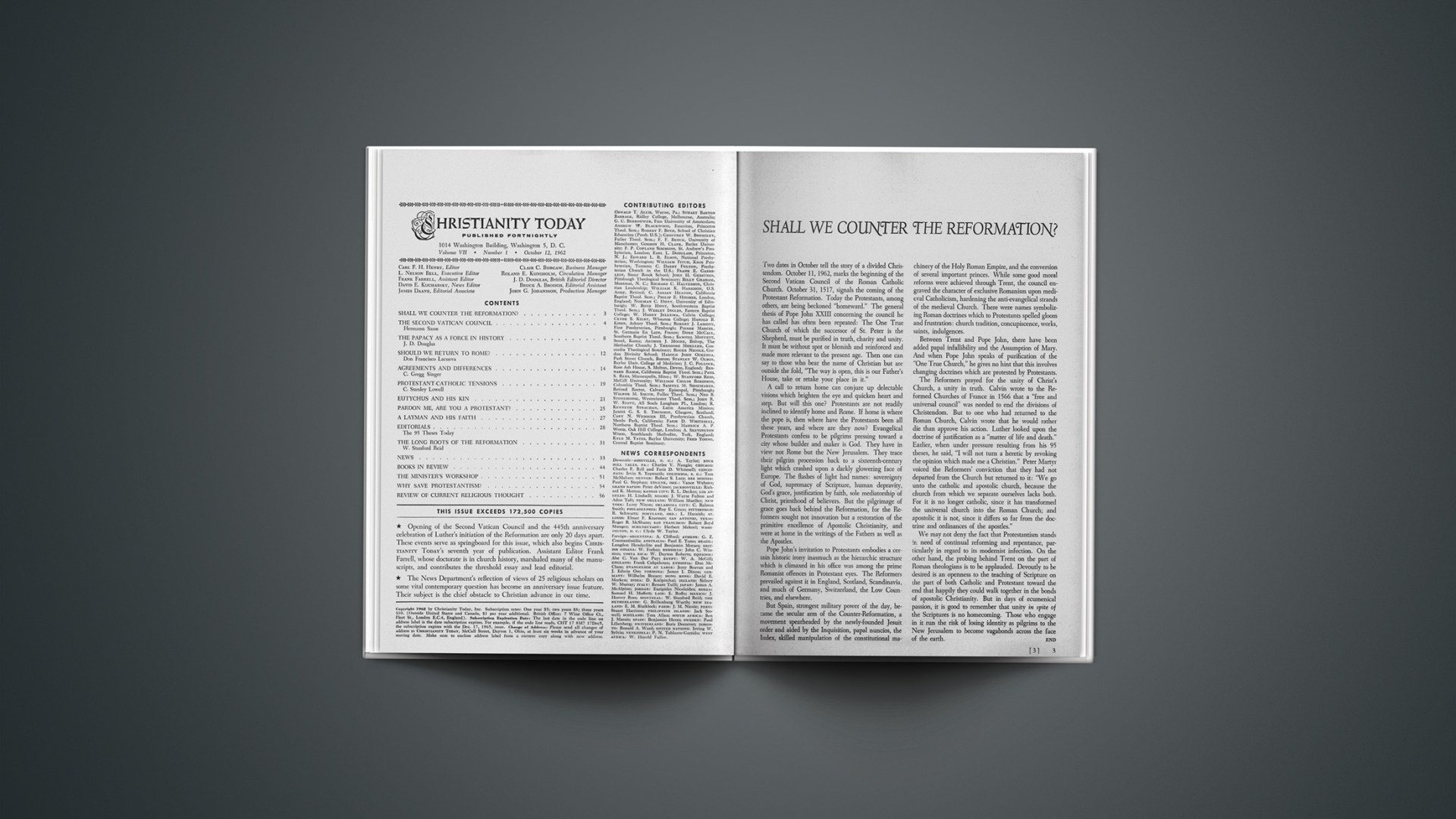Two dates in October tell the story of a divided Christendom. October 11, 1962, marks the beginning of the Second Vatican Council of the Roman Catholic Church. October 31, 1517, signals the coming of the Protestant Reformation. Today the Protestants, among others, are being beckoned “homeward.” The general thesis of Pope John XXIII concerning the council he has called has often been repeated: The One True Church of which the successor of St. Peter is the Shepherd, must be purified in truth, charity and unity. It must be without spot or blemish and reinforced and made more relevant to the present age. Then one can say to those who bear the name of Christian but are outside the fold, “The way is open, this is our Father’s House, take or retake your place in it.”
A call to return home can conjure up delectable visions which brighten the eye and quicken heart and step. But will this one? Protestants are not readily inclined to identify home and Rome. If home is where the pope is, then where have the Protestants been all these years, and where are they now? Evangelical Protestants confess to be pilgrims pressing toward a city whose builder and maker is God. They have in view not Rome but the New Jerusalem. They trace their pilgrim procession back to a sixteenth-century light which crashed upon a darkly glowering face of Europe. The flashes of light had names: sovereignty of God, supremacy of Scripture, human depravity, God’s grace, justification by faith, sole mediatorship of Christ, priesthood of believers. But the pilgrimage of grace goes back behind the Reformation, for the Reformers sought not innovation but a restoration of the primitive excellence of Apostolic Christianity, and were at home in the writings of the Fathers as well as the Apostles.
Pope John’s invitation to Protestants embodies a certain historic irony inasmuch as the hierarchic structure which is climaxed in his office was among the prime Romanist offences in Protestant eyes. The Reformers prevailed against it in England, Scotland, Scandinavia, and much of Germany, Switzerland, the Low Countries, and elsewhere.
But Spain, strongest military power of the day, became the secular arm of the Counter-Reformation, a movement spearheaded by the newly-founded Jesuit order and aided by the Inquisition, papal nuncios, the Index, skilled manipulation of the constitutional machinery of the Holy Roman Empire, and the conversion of several important princes. While some good moral reforms were achieved through Trent, the council engraved the character of exclusive Romanism upon medieval Catholicism, hardening the anti-evangelical strands of the medieval Church. There were names symbolizing Roman doctrines which to Protestants spelled gloom and frustration: church tradition, concupiscence, works, saints, indulgences.
Between Trent and Pope John, there have been added papal infallibility and the Assumption of Mary. And when Pope John speaks of purification of the “One True Church,” he gives no hint that this involves changing doctrines which are protested by Protestants.
The Reformers prayed for the unity of Christ’s Church, a unity in truth. Calvin wrote to the Reformed Churches of France in 1566 that a “free and universal council” was needed to end the divisions of Christendom. But to one who had returned to the Roman Church, Calvin wrote that he would rather die than approve his action. Luther looked upon the doctrine of justification as a “matter of life and death.” Earlier, when under pressure resulting from his 95 theses, he said, “I will not turn a heretic by revoking the opinion which made me a Christian.” Peter Martyr voiced the Reformers’ conviction that they had not departed from the Church but returned to it: “We go unto the catholic and apostolic church, because the church from which we separate ourselves lacks both. For it is no longer catholic, since it has transformed the universal church into the Roman Church; and apostolic it is not, since it differs so far from the doctrine and ordinances of the apostles.”
We may not deny the fact that Protestantism stands in need of continual reforming and repentance, particularly in regard to its modernist infection. On the other hand, the probing behind Trent on the part of Roman theologians is to be applauded. Devoutly to be desired is an openness to the teaching of Scripture on the part of both Catholic and Protestant toward the end that happily they could walk together in the bonds of apostolic Christianity. But in days of ecumenical passion, it is good to remember that unity in spite of the Scriptures is no homecoming. Those who engage in it run the risk of losing identity as pilgrims to the New Jerusalem to become vagabonds across the face of the earth.
END










